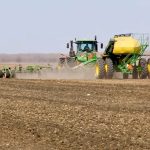Farmers know better than anyone that changes in temperature or precipitation have a ripple effect on our interdependent global agricultural systems. The impacts of climate change could result in more disruptions to food supply chains around the world and increased market volatility here in Canada.
For most of Canada, complex climate models predict wetter springs, hotter and drier summers, milder winters and more extreme weather such as droughts, floods, heat waves, hail and tornadoes.
The list of potential effects is long. Wetter springs could delay seeding and increase the need for tile drainage. Heat stress during the flowering period for wheat and canola could reduce yields. Milder winters could result in the migration of new pests and diseases which could also affect a crop’s marketability. More frequent droughts affect pasture land and cattle grazing and increase demand for irrigation using scarce water resources while more intense rainfall events could cause flooding and soil erosion. Severe storms could lead to more power outages that would affect livestock heating and cooling systems and automated feeding and milking systems.
Read Also

Celebrating women in agriculture
If you’ve been a long-time reader of Country Guide, you’ll have read many articles in our pages over the years…
In short, a changing climate will add to the strain on farm finances and the well-being of farm families.
The highs and lows
There is strong evidence that Canada’s climate is already changing. According to a report from Agriculture and Agri-Food Canada, between 1948 and 2016, the best estimate of mean annual temperature increase is 1.7 degrees Celsius for Canada as a whole. Northern Canada is heating up even faster.
This could mean longer growing seasons and the potential to grow different crop varieties or new crops. A report by Natural Resources Canada, for example, predicted the continued northward expansion of areas adapted to small cereal crops, particularly in north-central Canada. (Although the report also warns that summer water deficits in some boreal regions would accelerate soil carbon losses and diminish already limited soil quality.)
That same report projected yield declines in Quebec for wheat, soybeans, green peas, onions, tomatoes and cabbage but possible yield increases for corn, sorghum, canola, sunflowers, potatoes, tobacco and sugar beets.
Impacts are already being felt by Canadian farmers. According to the most recent Census of Agriculture, over the last decade more than 200,000 Canadian farmers experienced cost increases and/or a loss of revenue as a result of a changing climate.

Scoping out the opportunities
Tracey Baute, a field crop entomologist at the Ontario Ministry of Agriculture, thinks farmers will need to take a more integrated approach to pest management to combat changes in pest pressure. Insects are directly tied to temperature, she says, noting that means there could be new or overwintering pests, pests having more generations, or disruptions in the synchronization between pests and their natural enemies. She is also concerned that there could be “more resistance issues with pesticides.”
Baute predicts that farmers will likely need to rely less on one pest management strategy. Additional strategies could include scouting more frequently, collaborative monitoring, diversification of crop rotations, or creating habitat for natural enemies through intercropping, cover crops, flowering strips or connecting corridors between habitats. As part of a long-term strategy, improving soil health would also help crops to be more resilient to pests.
Mike Belan, who farms near Oil Springs, Ont., says protecting the soil is critical in their operation in order to be more resilient “when it’s too dry, too hot or there’s too much rain too fast,” he says. He found that participating in the Ontario Soil Network Challenge was a good opportunity for him to meet like-minded people focused on building soil health.
Belan discovered that a combination of 100 per cent no till and growing a cover crop mix of oats, crimson clover, radish, peas and triticale after winter wheat is paying off with better soil structure and water infiltration on his heavy clay soil. He is also experimenting with biostrips and interseeding a cover crop into standing corn.
Managing the risks
The resiliency and well-being of the farm team is also a crucial component of farm sustainability. Coping with adverse weather and other elements out of their control can be very anxiety-producing, says Deborah VanBerkel, a registered psychotherapist with the Canadian Centre for Agricultural Wellbeing. The centre is working to foster resilience among Canadian farmers by increasing the availability of mental health supports. These programs are aimed at increasing the mental health literacy of those working in agriculture as well as increasing the ag literacy of counsellors so they are better equipped to understand the unique challenges faced by farmers.
The centre is also working on a tool kit to help producers cope with catastrophic events such as livestock disease outbreaks, extreme weather events, or financial crises.
There are many resources to help farmers adapt to the uncertainties of climate change. For example, farmers can leverage crop insurance, improved crop genetics, technological advancements and government programs that provide funding for adaptive farm management practices.
Organizations that support on-farm research and peer-to-peer learning, such as the Ontario Soil and Crop Improvement Association and the Ontario Soil Network (a consortium of passionate farmers, researchers and environmental advocates), are helping farmers determine optimal management practices. The ALUS organization is helping farmers and ranchers nation-wide implement nature-based climate solutions through collaboration at the local level.
Mathieu Lipari, program manager at Farm Management Canada (FMC), explains that although climate change hasn’t really changed the types of risks that farmers are facing, it has increased the frequency or likelihood of certain risk and this must be accounted for when a farm conducts their risk assessment. Having a risk management plan can both increase profits and reduce producer stress.
To help farmers assess and mitigate a wide range of risks identified by farmers and other industry experts, FMC created AgriShield, an online platform that includes risks associated with climate change.
Heather Watson, executive director at FMC, makes the case for taking a comprehensive approach to risk management planning rather than considering individual risks. “It is important to understand the connections between the various areas of responsibility in farming,” she says. As an example, she points out that while it may make sense from a climate management perspective to put in tile drainage or irrigation to manage moisture, it may not make sense from a financial perspective.
Unfortunately, many farmers are not taking advantage of the benefits of taking a long-term, proactive approach to managing risks and seizing opportunities, says Watson. FMC’s research shows that only one in five farmers in Canada has a strategic plan for their operation.
Agronomists, veterinarians and other farm advisors can help farmers stay abreast of changes in pest and disease pressure or other risks associated with climate change. Watson encourages farm advisors to use AgriShield (myagrishield.ca) with their clients to help them with risk management planning. Watson notes that AgriShield also aligns with the Sustainable Agriculture Initiative Platform which is increasingly required in the industry.
















